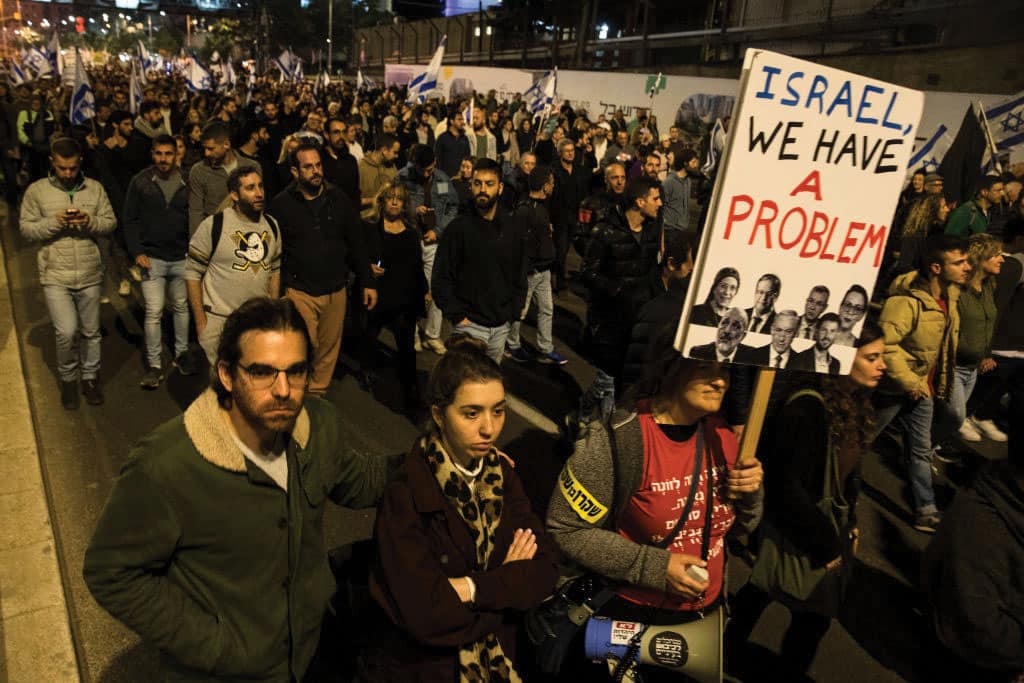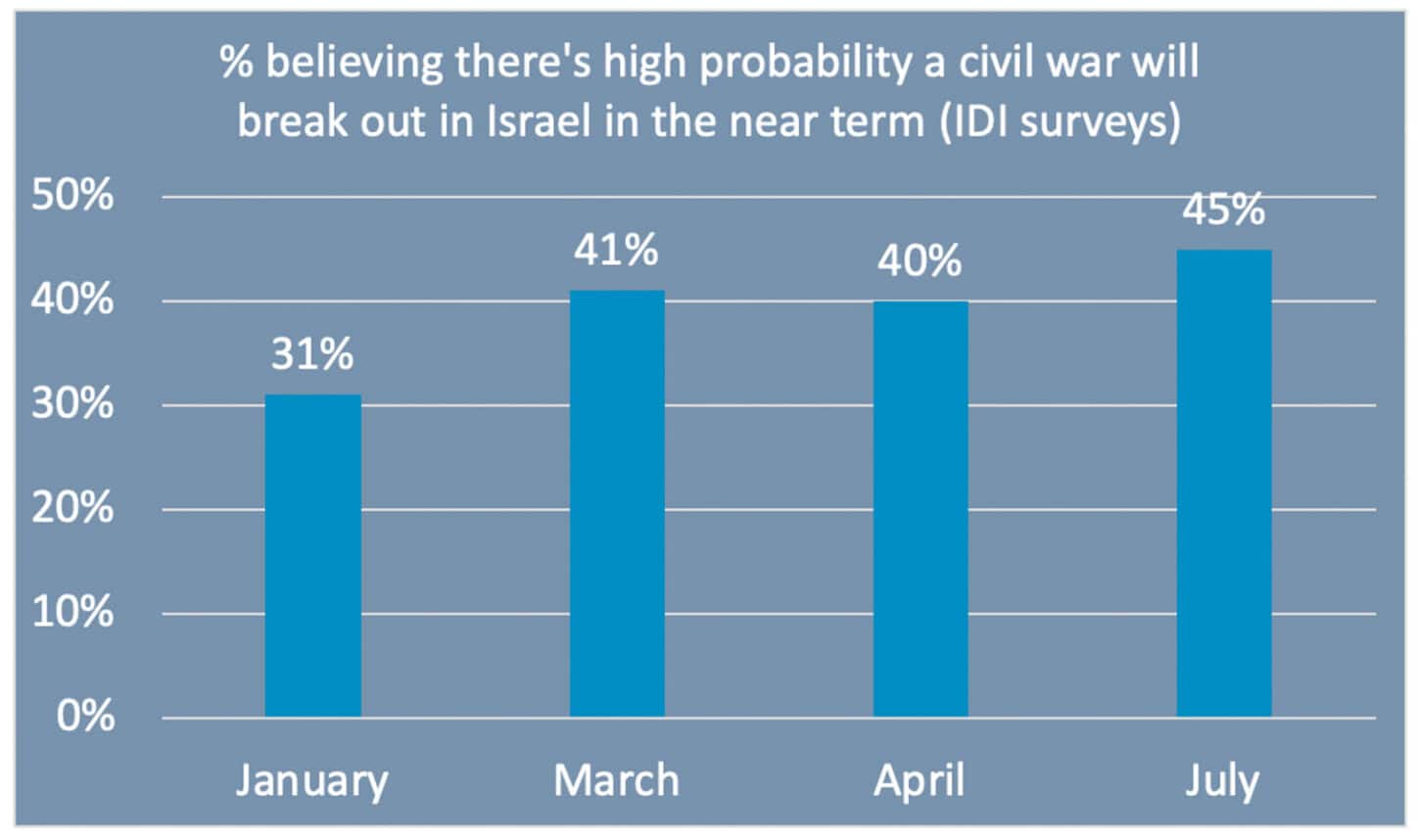 Protesters hold flags and signs during a rally against the new Israeli far-right government on January 21, 2023 in Tel Aviv, Israel. (Photo by Amir Levy/Getty Images)
Protesters hold flags and signs during a rally against the new Israeli far-right government on January 21, 2023 in Tel Aviv, Israel. (Photo by Amir Levy/Getty Images) Theoretically, it should have been simple: the public wants the government to take into account the threat of pilots and other elite soldiers to quit their volunteer reservist duty — so the government, as representatives of the public, ought to listen.
Theoretically, it should have been simple: the public feels that protesting by refusing to attend to reservist duty is a bridge too far as it weakens the IDF and endangers the country – and so then the leaders of the protest movement, which claims to be a representative of the public, ought to listen.
Theoretically, a functioning government relies on the support of the public and must be attentive to what the public says. Theoretically, a functional government relies on the support of the public, and care must be taken not to lose it.
Practically, none of this happens in Israel today. Israel enters a very tense week, in which the first piece of judicial reform legislation is supposed to pass, and no attention is paid to what the public wants. It’s natural that the government does not pay attention to the leaders of the protest movement. It’s also natural that the protest movement leaders do not listen to the government. What is surprising, what is strange, is that both the government and the protest leaders stopped paying attention to what the majority of the public wants.
What is surprising, what is strange, is that both the government and the protest leaders stopped paying attention to what the majority of the public wants.
The government is no longer interested in the question of whether the public is in favor of its legislation (under the current circumstances, a majority would give up on it). The protest movement is no longer interested in whether the public believes that the situation justifies the means of refusing reserve duty and blocking roads (the public finds these measures too extreme). The public is no longer relevant. Israel’s system of government is a democracy, the public is the supposed sovereign, but nowadays the public is no more than an ineffective spectator.
What would have happened had both listened to the public? A survey published Monday found 58% who favor a halt of reform legislation and a focus on strengthening unity. In the same survey 68% opposed the reservists’ protest. Reading more polls, and trying to extract consistent insights from them, leads to the following conclusion: If the public had its way, the government would stop the legislation, negotiations would resume, the opposition would accept certain measures of legal reform, reservists would return to their units. Surely, some Israelis would be bitter with such a conclusion. Those who failed to pass a comprehensive reform and those who failed in their attempt to overthrow the government. They are the minority.
Alas, the battle now taking place in Israel will not be decided by a majority, but rather by brute force. The government has the power to legislate at its disposal even in the absence of public support. The protest movement has power because many of its supporters are dominant in centers of power, such as army units and financial institutions. And both sides seem to insist on violating, at least for the time being, the Cold War theory known as MAD – “Mutual Assured Destruction.” The superpowers hoped that a nuclear war would not be initiated by a rival, because of the assumption that no one is crazy enough to bring about the destruction of an opponent at the cost of his own destruction. The USA would not attack the USSR — and the USSR would not attack the USA — as long as both understood that an attack meant unbearable damage to both sides.
This logic, it turns out, does not hold in Israel. The government and the protest are facing each other, armed with what in civilian terms is equivalent to nuclear arrowheads (45% believe a civil war is likely in the near term), and give the impression that they intend to shoot. One side insists on destroying the reform initiative, even if the price is the state’s destruction. The other side insists on passing the reform, even if the price is the state’s destruction.
In his fascinating book “Israel in a Nuclear Middle East”, Jesse Ferris writes about MAD and its ability to ensure Israel’s existence in the event that Iran acquires nuclear weapons. “Is it possible to discourage a messianic leader motivated by a desire to realize redemption” from using nuclear weapons Ferris asks, and then continues: “The well-known Islamic scholar Bernard Lewis thought not. Regarding the Iranian leadership during the days of President Mahmoud Ahmadinejad, he said: “For people with such an [apocalyptic] worldview, mutual assured destruction is not a constraint but an incentive.” Yitzhak Shamir, former Prime Minister of Israel, also believed that in the Middle East, “it is impossible to maintain a balance of terror according to the American-Soviet formula.” The reason for this – Shamir thought – is that “it is impossible to trust the rationality of some of the Arab rulers.”
Looking at Israel this week one must ask: And what about Jewish rulers?
Something I wrote in Hebrew
Here’s what I wrote on the attempts to portray the Israeli left-right divide using American terms:
An attempt to portray the Israeli center-left with the terms used to describe a post-national radical from Berkeley is pathetic. The Israeli center-left is much more patriotic than any progressive group in any western country you might choose. It wraps itself in the national flag. It highlights its militarist combat past … There is no American style “conservatism” in Israel. The Israeli right is a strange mixture of a revolutionary spirit, a clerical attitude, a post-colonialist grumbling and a lot of populism. There is no “progressiveness” in Israel either, except on the fringes of the left. The protesters are bourgeois, somewhat conservative, patriotic, family-oriented.
A week’s numbers
This is what civil anxiety looks like.

A reader’s response:
Amy Hertzfeld says: “Shmuel, some of your recent columns … made me worry about the future of Israel”. My response: I am worried, and so should you.
Shmuel Rosner is senior political editor. For more analysis of Israeli and international politics, visit Rosner’s Domain at jewishjournal.com/rosnersdomain.























 More news and opinions than at a Shabbat dinner, right in your inbox.
More news and opinions than at a Shabbat dinner, right in your inbox.